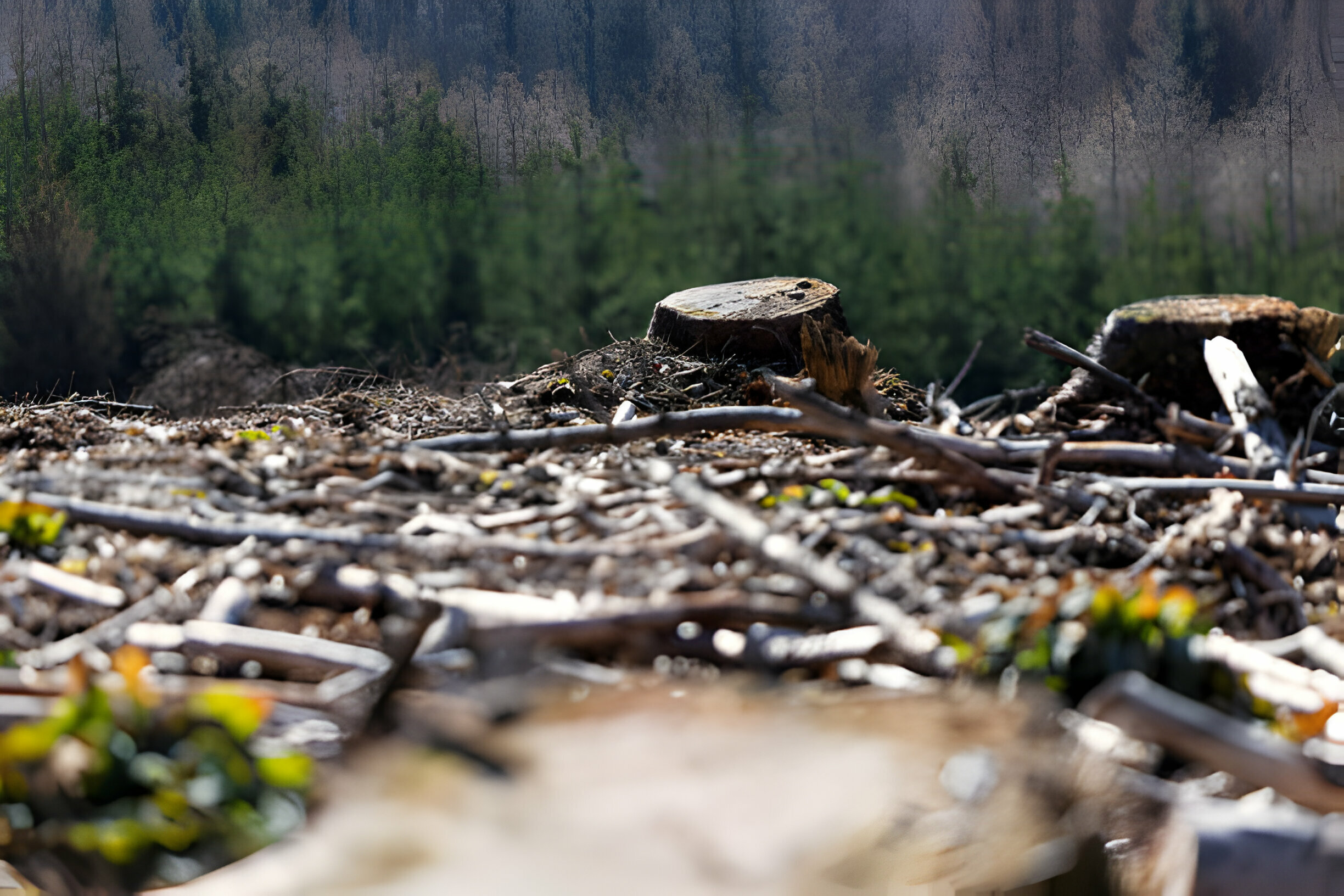Do you know that every second, an area of forest the size of a football field is lost? This rapid deforestation directly impacts climate change by releasing carbon dioxide into the atmosphere. You play a crucial role in understanding how deforestation relates to climate change. Let’s explore together the significant impact of deforestation on carbon emissions, greenhouse gases, and global warming. Join us on this journey to uncover the importance of protecting our forests for a sustainable future.
Deforestation’s Impact on Carbon Emissions
Deforestation releases carbon dioxide into the atmosphere, contributing significantly to climate change. Forests play a crucial role in carbon sequestration, storing vast amounts of carbon essential for the global carbon cycle. However, when trees are cut down or burned, this stored carbon is released back into the atmosphere, leading to increased atmospheric pollution and exacerbating the climate impact. Land degradation resulting from deforestation further intensifies these effects, disrupting ecosystems and reducing the Earth’s natural ability to absorb greenhouse gases. To mitigate these consequences, forest preservation is paramount in combating climate change by maintaining carbon sinks and preventing additional emissions that contribute to global warming.
Forest Loss and Greenhouse Gas Contribution
Forests store significant amounts of carbon, contributing to the increase in carbon dioxide levels in the atmosphere. Forest degradation intensifies greenhouse gas emissions and worsens climate impact. The environmental consequences of forest loss are profound, affecting biodiversity and exacerbating global warming.
Forest Loss and Greenhouse Gas Contribution
| Forest Degradation | Greenhouse Gas Emissions | Climate Impact | Carbon Storage |
|---|---|---|---|
| Accelerates | Increases | Worsens | Stores |
The ongoing destruction of forests not only releases stored carbon but also hampers the planet’s ability to absorb future emissions. This cycle perpetuates environmental harm, underscoring the urgent need for sustainable forest management practices to mitigate greenhouse gas contributions and their detrimental effects on our climate.
Role of Deforestation in Global Warming
The significant carbon dioxide emissions from deforestation contribute to the escalation of global warming levels. Forest degradation, climate impact, land conversion, carbon release, and environmental consequences are all interconnected aspects of this pressing issue.
- Forest degradation: Each tree lost represents a reduction in nature’s ability to absorb carbon dioxide.
- Climate impact: Rising temperatures due to increased greenhouse gases disrupt ecosystems and weather patterns.
- Land conversion: Transforming forests into agricultural land releases stored carbon and reduces biodiversity.
Understanding the gravity of these factors is crucial for taking action to protect our planet’s forests and combat the devastating effects of deforestation on our climate.
Carbon Storage in Forests Vs. Fossil Fuels
When it comes to carbon storage, forests act differently than fossil fuels do in the atmosphere. Forests play a crucial role in carbon sequestration, capturing and storing carbon through photosynthesis, while fossil fuels release stored carbon dioxide when burned. This difference in forest carbon dynamics versus underground fossil fuels impacts the carbon cycle significantly. The table below highlights key distinctions between forest and fossil fuel contributions to the climate mitigation strategies.
| Aspect | Forests | Fossil Fuels |
|---|---|---|
| Carbon Sequestration | Efficient at storing carbon dioxide through photosynthesis and biomass accumulation | Release stored carbon dioxide into the atmosphere when burned |
| Impact on Climate | Helps mitigate climate change by removing CO2 from the air | Contributes to global warming by releasing CO2 during combustion |
| Mitigation Strategy | Protecting forests is crucial for reducing greenhouse gas emissions | Transitioning away from fossil fuel use essential for combating climate change |
Understanding these differences underscores the importance of sustainable forest management practices in mitigating climate change effectively.
Deforestation’s Influence on Climate Change
To understand how deforestation impacts, think about the carbon emissions released into the atmosphere. It’s crucial to grasp the magnitude of deforestation’s influence on climate change:
- Climate impact: Deforestation significantly contributes to global warming by releasing vast amounts of carbon dioxide.
- Forest conservation: Protecting forests is vital as they play a crucial role in storing carbon and combating climate change.
- Environmental consequences: The destruction of forests not only disrupts ecosystems but also accelerates climate change, leading to severe environmental repercussions.
Considering these factors, implementing sustainable solutions becomes imperative to mitigate the adverse effects of deforestation and preserve our planet for future generations.
Ecosystem Protection for Climate Mitigation
Consider prioritizing ecosystem protection to aid in mitigating the impacts of human activities on the environment. Biodiversity preservation plays a crucial role in maintaining healthy ecosystems, supporting various species and ensuring resilience against climate change. Sustainable land use practices can help conserve natural habitats while promoting carbon sequestration to offset greenhouse gas emissions. Ecosystem restoration efforts are essential in restoring degraded areas, enhancing biodiversity, and improving overall ecosystem functions. By focusing on these aspects, you can actively contribute to climate mitigation strategies that not only protect our planet’s vital ecosystems but also promote long-term sustainability for future generations. Embrace these practices to make a positive impact on the environment and combat the challenges posed by human-induced climate change.
Sustainable Practices for Carbon Reduction
Sustainable forest management aids in drawing down carbon dioxide, contributing to carbon reduction efforts. When you engage in practices like forest regeneration, carbon sequestration, and reforestation projects, you are actively participating in the preservation of our environment. By supporting sustainable forestry and embracing climate-friendly practices, you play a crucial role in mitigating climate change impacts. Here’s why your involvement matters:
- Forest regeneration helps restore ecosystems for future generations.
- Carbon sequestration reduces greenhouse gas emissions, combating global warming.
- Reforestation projects contribute to biodiversity conservation and sustainable land use.
Your commitment to these initiatives encourages a healthier planet and paves the way for a more sustainable future.
Deforestation and Global Carbon Footprint
Addressing the alarming rate of forest loss is crucial for reducing carbon emissions and combating global warming. Land degradation, biodiversity loss, and soil erosion are direct consequences of widespread deforestation. When forests are cleared, not only does it release stored carbon into the atmosphere, but it also disrupts ecosystems that play a vital role in carbon sequestration. Without forests acting as natural carbon sinks, the planet loses a critical defense mechanism against climate change. Furthermore, preserving forests enhances climate resilience by maintaining essential habitats for diverse species and supporting ecological balance. Protecting these vital ecosystems is essential for ensuring a sustainable future where both nature and humans can thrive together in harmony.
Forests as Climate Change Mitigation Tools
When protecting forests, you help combat global warming by preserving natural carbon sinks. Forest restoration not only helps in carbon sequestration but also provides reforestation benefits such as enhancing biodiversity conservation and promoting climate resilience. By supporting initiatives that focus on restoring damaged or lost forests, you contribute to a healthier ecosystem and a more sustainable future for all living beings. Each tree planted, each acre restored, and each effort towards protecting these vital ecosystems makes a profound impact on mitigating climate change and ensuring the well-being of our planet for generations to come. Join hands with others to make a difference today!
Urgency of Combating Deforestation for Climate
Moving on from the importance of forests as climate change mitigation tools, let’s delve into the urgency of combating deforestation for climate resilience. To address this critical issue effectively, a multi-faceted approach is essential. Check out the table below for key strategies:
| Reforestation Urgency | Biodiversity Conservation | Carbon Sequestration |
|---|---|---|
| Accelerating efforts to replant trees lost to deforestation. | Protecting and preserving diverse ecosystems and species. | Storing carbon in forests to mitigate greenhouse gas emissions. |
Emphasizing sustainable forestry practices not only aids in carbon sequestration but also promotes biodiversity conservation. Implementing climate resilience strategies is vital to combat the adverse effects of deforestation on our planet’s health and ecosystem balance.


